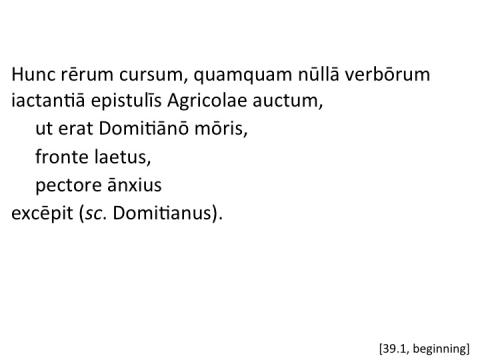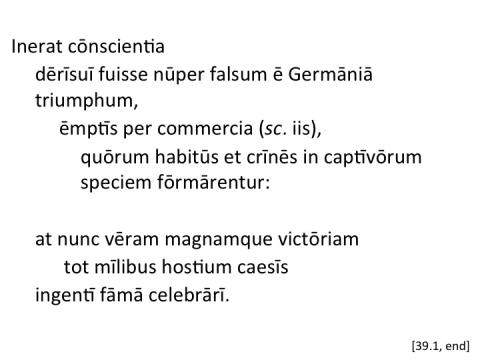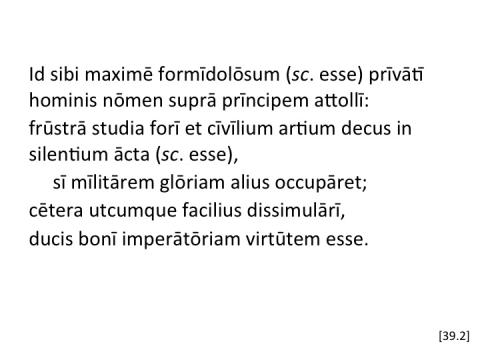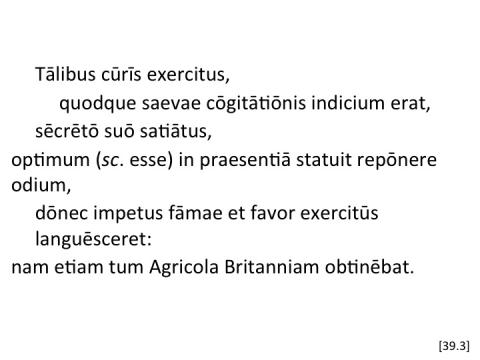Overview: Domitian's jealousy is aroused by the news of Agricola's success; however, for the time being, the emperor does not dare to display his hatred openly. (Stuart); this chapter begins on f. 63v of the codex Aesinas.
39.1
epistulīs: used by Tacitus and his contemporaries of one missive, on the analogy of litterae. (Stuart); "in his official report." (Gudeman)
auctum: modest reticence on the subject of his own achievements is a trait of Agricola which Tacitus never tires of mentioning. See 8.3, 18.6. (Stuart)
mōris: See 33.1. (Pearce) erat Domitiānō mōris = Domitianus, ut ei moris erat. For a similar attraction into the subordinate clause, see note ch. 15.2 and Introd. p. xxx #20. (Gudeman)
fronte: "outwardly." (Furneaux)
excēpit: sc. Domitianus. (Damon); the fact that Tacitus is able to report Domitian's behavior, and the use of excepit for accepit, seem to imply, on the one hand, the presence of witnesses; on the other, that the letter was read to the emperor. (Gudeman)
inerat cōnscientia: "he felt conscious." (Furneaux)
dērīsuī: "an object of mockery." A rare post-Augustan word. See note ch. 32.3. (Gudeman)
falsum ... triumphum: modern historical and topographical research has shown that as a result of Domitian's campaign in Upper Germany, in 83-84, the Roman frontier was advanced considerably and a bulwark was erected against the formidable Chatti. He laid himself open to popular criticism simply because he celebrated a triumph without having won a decisive victory in the field. (Stuart); the campaign against the Chatti, in 83 AD, again sneeringly alluded to in Germ. 37.5 triumphati magis quam victi sunt. Although Domitian did not win any military laurels himself, the war, carried on under his auspices, resulted in a permanent extension of the Roman limes or frontier, as Tac. Germ. 29.3, though he purposely conceals Domitian's name, admits. (Gudeman)
ēmptīs: the subject of this ablative absolute is the unexpressed antecedent of quorum. As for the facts, we read the same story of Caligula and may feel some doubts of its truth here. (Pearce); a similar story is told of Caligula by Suet. Cal. 47. (Gudeman)
crīnēs in captīvōrum speciem: with reference to color and length. See chapter 11.2. We are told that the Germans themselves sometimes intensified the natural hue of their hair by artificial means. (Stuart)
fōrmārentur: subjunctive of 'reported speech.' It was a statement of the derisores. (Pearce) [A&G 592]
celebrārī: depends upon inerat conscientia. An accusative with infinitive governed by a noun ... is quite common: e.g. 9.5; 40.1; 43.2 ... . On the conciseness of expression, see Introd. p. xxxiii #7. (Gudeman)
39.2
id sibi: supply esse. (Stuart) id sibi ... formīdolōsum: sc. esse videbatur, to be supplied by zeugma out of inerat conscientia, the presence of sibi preventing the latter from being retained as the governing clause. See Introd. p. xxxii #6b. (Gudeman)
prīvātī hominis: "subject." (Gudeman)
suprā prīncipem: "above that of the emperor." (Stuart)
studia ... acta: sc. esse, with the compound subject studia et decus. (Damon) studia forī: "the activities of the forum," with especial reference to oratory. (Stuart) studia forī et cīvīlium artium decus: these are expressive terms for "eloquence" and "politics." Studia, gives the idea of the keen rivalry of the law courts; decus that of the honourable standing of the senatorial politician. (Pearce); observe the chiasmus. On the blighting effect of Domitian's despotism, see ch. 2. (Gudeman) cīvīlium artium decus: "the honorable pursuits of political life." (Stuart)
occupāret: the word has, as often, the sense of forestalling another in the possession of something. Agricola usurped the renown which Domitian felt was rightly his own. (Stuart)
cetera: "all other eminent accomplishments." (Gudeman)
utcumque: here an adverb "somehow or other." The only classical use of the word is as a conjunction "in whatever way." (Pearce)
dissimulārī: "be ignored, overlooked." (Gudeman); see on 6.2 dissimulationem. (Pearce)
imperātōriam ... esse: "was an imperial quality," i.e. should belong to the Emperor alone. A corollary of this would be that the possessor of pre-eminent military genius might aspire to the empire: Vespasian's own rise would be before the mind of his son Domitian. (Pearce) ducis bonī imperātōriam virtūtem: i.e. military genius was a peculiarly imperial characteristic, to which a mere subject ought never to lay claim, for its possession involved an eminence too exalted to be overlooked, besides suggesting odious comparisons with an emperor so lacking in this very quality as Domitian. On the predicative position of the attributive, see Introd. p. xxv #2. (Gudeman)
39.3
exercitus: "wrought up by such reflections." (Gudeman)
quodque ... erat: in apposition with the following clause. (Gudeman)
sēcrētō suō satiātus: "having indulged himself to the full in his wonted privacy." Tacitus has given us in the Annals an unforgettable picture of Tiberius as a taciturn, distrustful man, given to secret broodings and gloomy imaginings. The same traits are bestowed upon Domitian. (Stuart); i.e. not giving vent to his displeasure, but cherishing a secret malice. Suo, emphatic, "his usual." The words explain optimum statuit reponere odium. (Pearce); i.e. having fully indulged in his characteristic secret broodings over this matter. Note the alliteration. (Gudeman)
optimum: sc. esse, with reponere as subject of the indirect statement introduced by statuit. (Damon)
in praesentiā: possibly the ablative of the substantive, not the neuter plural participle with tempora understood. Neither form occurs elsewhere in Tacitus, he using in praesens instead, though e praesentibus is also frequently found. As an ablative singular in an adverbial sense, the phrase is extremely rare. (Gudeman)
repōnere odium: the same trait is attributed by Tacitus to Tiberius and Nero. See Ann. 1.69; 16.5. (Gudeman)
impetus: "the onward sweep." (Stuart) impetus fāmae, etc.: i.e. until the enthusiasm in Rome over his achievements and his popularity among the soldiers in Britain had had time to cool down. On the singular predicate, see note ch. 4.3. (Gudeman)
nam ... obtinēbat: an explanation of Domitian's resolve to temporize. Agricola was master of Britain and, if balked in his ambitions, might follow in the footsteps of Vitellius and Vespasian, who had likewise held control of provinces, and try to make himself emperor. (Stuart); for if summoned to Rome while his victories were still fresh and there was an army at his back, Agricola might easily have deposed the tyrant. The phrase etiam tum skillfully establishes the transition to the next chapter, dealing with the events immediately following the recall, which latter, because implied in the context, is not expressly mentioned. The motives for Domitian's conduct here given must not be accepted without some allowance. Agricola had been governor of Britain for a longer period than any of his predecessors. His campaigns were very expensive and yielded no commensurate results. Domitian had not the interest in Britain that Vespasian and Titus had; finally the Dacian revolt was upon him, so that the emperor may well have been justified in checking Agricola's lust of conquest. (Gudeman)




